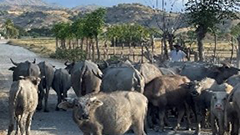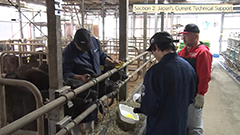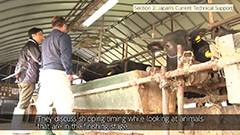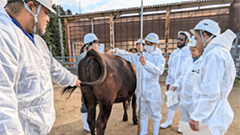Significance and issues of international cooperation in the livestock sector

Pasture cows in a developing country
Livestock production is a very important industry, both as a source for essential nutrients and as a means for farming communities globally to make a living, including areas where crop cultivation is difficult.
To transition from raising livestock from subsistence to livestock farming as a livelihood or a business, it is essential to build a system to provide specialized technical services.
In international cooperation in the livestock sector, interest tends to focus on areas like reproduction technology for genetic improvements, and laboratory techniques to diagnose infectious disease in livestock.
However, even if such technologies are introduced to a country, they do not always immediately reach farm production sites and become profitable.
For example, artificial insemination won’t easily result in conception if the cow is in poor nutritional condition.
Moreover, laboratory tests won’t be requested for the diagnosis of disease unless farmers, have a constant face-to face relationship with clinical veterinarians and animal health officers.
In other words, demonstrating advanced technology becomes effective when it is premised on the creation of technical service systems that support basic daily livestock management, and with trust and collaboration between farmers and technical extension and veterinary services.
To convey Japan’s general support for livestock farmers
In Japan, technicians from various organizations frequently visit the farms and provide technical services from production to shipment.
Technical support is generally provided through cooperation between several related organizations in Japan, which support basic daily livestock management and it was hardly ever addressed as a topic of learning materials.
It is also very difficult to convey the importance of such a system as a concept, so the visualization of actual situations has been required.
On the other hand, from the perspective of preventing livestock infectious diseases, in Japan, after entering one livestock farm, it is not possible to enter other livestock farms, livestock markets or other relevant institutions for a certain period.
Therefore, there are limited opportunities to see technicians of various organizations (Livestock Hygiene Service Centers, Livestock Clinics, Agriculture Cooperative, Extension Officers, Prefectural officials, etc.) visiting livestock farmers and actually providing technical services.
Within these constraints, we created the JICA-Net multimedia-based learning material, “Extension and Animal Health Services on Livestock farms ~Towards the Stable Supply of Safe Foods of Animal Origin~”(YouTube, external link)
, to introduce Japan’s three technical services: veterinary medicine, infectious disease control, and extension services.

A farm advisor from the Agricultural Cooperative who visited a livestock farm to register a newborn calf.
The relationship of trust between technicians and livestock farmers as seen through interviews

Various related organizations support livestock farmers by collaborating with each other.
First, the material features the history of Japan's livestock promotion and extension from post-World War II to the present day. Next, introducing scenes like a documentary film, which are set in the livestock farm in Fukushima Prefecture, where the farm advisor from the Agricultural Cooperative visits to register a newborn calf, and the clinical veterinarian visits for reproductive examination, and so on. It also explains Japan’s three technical services supporting livestock farmers: veterinary medicine, infectious disease control, and extension services.
In order to convey the message that the various agencies involved in the livestock sector are working together to provide technical support to livestock farmers, through interviews with livestock farmers and technicians, the material shows their thoughts and how livestock farming is conducted on the basis of a firm relationship of trust between farmers and technicians.
Lastly, the material introduces issues in the livestock sector in developing countries and examples of JICA’s cooperation in Sri Lanka and Namibia as our efforts for the solution.
Introducing history of Japanese Livestock Development and Technical Support to the World
The material is intended to be used as a lecture material for JICA Knowledge Co-Creation Program and Country Training in livestock sector, a promotion and extension material in JICA Technical Cooperation Projects and JICA Grassroot Technical Cooperation Projects, a lecture material for universities in the livestock sector in Japan, and a training material for Japanese technicians (veterinarians (of Livestock Hygiene Service Centers and Livestock Clinics), artificial insemination technicians, extension officers in the livestock sector, the Agricultural Cooperative staff, etc).
We hope that the wide use of this material will contribute to international cooperation in the livestock sector, making use of Japan's knowledge and experience.
Finally, we would like to thank all those who cooperated in the filming of this learning material.

JICA Knowledge Co-Creation Programs participants who are learning livestock technology in Japan
TAKAHASHI Yoshimi
JICA Economic Development Departmen
*The Material(s) mainly applied
Extension and Animal Health Services on Livestock farms ~Towards the Stable Supply of Safe Foods of Animal Origin~
Livestock farming requires a range of technical support from production to shipment. Therefore, various public and private technicians frequently visit the livestock farm and provide technical services. This video introduces three technical services - veterinary medicine, infectious disease control, and extension services - with interviews with livestock farmer and technicians.




scroll